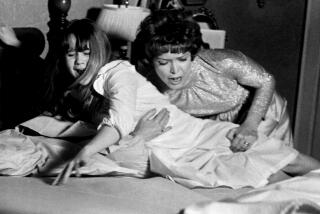‘South of Broad’
Deep friendships are forged from a wide range of factors -- common interests, common careers, common heritage, even common friends. But the friendships that take root in the soul tend to be forged by fire -- a shared trauma, a shared survival, a shared confrontation with evil. In those relationships, outsiders often can’t sense the depth of the bond or understand why it holds fast against logic.
Such friendships form the core of Pat Conroy’s new novel, “South of Broad,” his first since 1995’s “Beach Music.” That’s a long dry spell even for a novelist legendary for dry spells. In a career that began with “The Boo” in 1970, and carried through such bestsellers as “The Great Santini” in 1976, “The Lords of Discipline” in 1980 and “The Prince of Tides” in 1986, Conroy has long gone five or six years between novels.
This more extended delay has not been good for “South of Broad.”
Conroy built his reputation using a lyrical and powerful narrative voice to spin stories often from events in his own life and that of his combative family. At his best, as in the opening chapter of “Beach Music,” Conroy sweeps you up in a whirlwind of language and propels you through time and place so persuasively that you take in stride highly improbable plot twists (the appearance of a tiger at an opportune plot turn in “The Prince of Tides” comes to mind).
But with “South of Broad,” Conroy’s muscle has gone lax. You don’t get caught up in his narrative so much as you commit to it. Tragic twists just appear, lacking the kind of buildup that makes them work. The net effect is the surprises, even when not telegraphed, don’t surprise. They just click over like another mile on the odometer.
Part of the problem is the pacing of the story itself. Hurricane Hugo blasts into the novel near the end as a cataclysmic event, unleashing a storm surge that is both devastating and cleansing, at least for plot purposes. But Hugo, which hit in 1989, has been supplanted by Katrina as our collective notion of what calamity is, and what it can do to a city. That, and a gay character’s infection with the virus that causes AIDS, leaves “South of Broad” feeling like a leftover from the ‘90s.
The story is built around the life of Charleston resident Leopold Bloom King, named by his Joyce-worshiping mother and damned by circumstances. His older brother, Steve, killed himself -- Leo discovered the body in the bloody bathtub -- and neither Leo nor his parents ever really recovered. Add in a chance moment in which Leo let himself be a patsy -- holding drugs for a high school acquaintance as a police raid descends -- and his life is set for ruin.
He becomes a beloved local newspaper columnist in Charleston, in part due to the circle of friends he assembles in 1969 during his senior year in high school. There are the Poe twins, Sheba and her gay brother, Trevor, both sexually abused as youngsters by their father and sexually precocious as teens (Trevor is the AIDS patient); Ike Jefferson, Leo’s black best friend in the still-segregated South; siblings Niles and Starla Whitehead, recurrent orphaned runaways from the mountain country; the tomboy Fraser Rutledge and her silver-spoon chewing brother Chadworth Rutledge X (they like the name “Chadworth” in the Rutledge family); and Molly Huger, the down-to-earth aristocrat’s daughter for whom Leo develops a lifelong crush.
Conroy reels his teenage characters through cliche showdowns of racial and class divisions, trying to make those broad social issues the backdrop to the personal stories in the narrative -- including the recurring presence of the shadowy and vicious Poe father. But Conroy doesn’t have anything new or interesting to say about the racial and class divides. And too many of his characters are set up as types instead of fully fledged people, incapable, at times, of anything more than the most mundane of dialogues.
Skip ahead to the summer of 1989, in the weeks before Hugo hit, and the friends’ lives have altered considerably. Sheba returns to Charleston as an A-list actress very publicly sleeping her way through Hollywood. Leo has married Starla, who is even more damaged than he and disappears for as long as a year at a time. Fraser has married Niles over the strenuous objections of her class-conscious family. Chadworth has married Molly, Leo’s not-so-secret love, but is a profligate philanderer; and Ike, married to a fellow cop, is about to become Charleston’s first African American police chief.
Sheba has returned to town to enlist the old gang to help her find Trevor, who has gone missing in San Francisco; she fears he has died or been left homeless by his illness.
So the gang dutifully takes her borrowed private jet (the reward of intimate favors bestowed on a Hollywood producer) out West and hits the streets, where the twins’ father also appears and pursues the friends, Trevor in tow, all the way back to Charleston. And when Hugo begins churning out in the Atlantic, you can feel the collision with evil like a bum knee reads a plummeting barometer.
Some of the old Conroy magic wells up in his description of the hurricane’s arrival, capturing both the hubris of those who stay and the paralyzing terror unleashed by the power of sea and storm. But it’s also telling that in a novel built around characters and friendships, the most engaged writing is about nature.
--
Martelle is an Irvine-based journalist and author of “Blood Passion: The Ludlow Massacre and Class War in the American West.”
More to Read
Sign up for our Book Club newsletter
Get the latest news, events and more from the Los Angeles Times Book Club, and help us get L.A. reading and talking.
You may occasionally receive promotional content from the Los Angeles Times.








